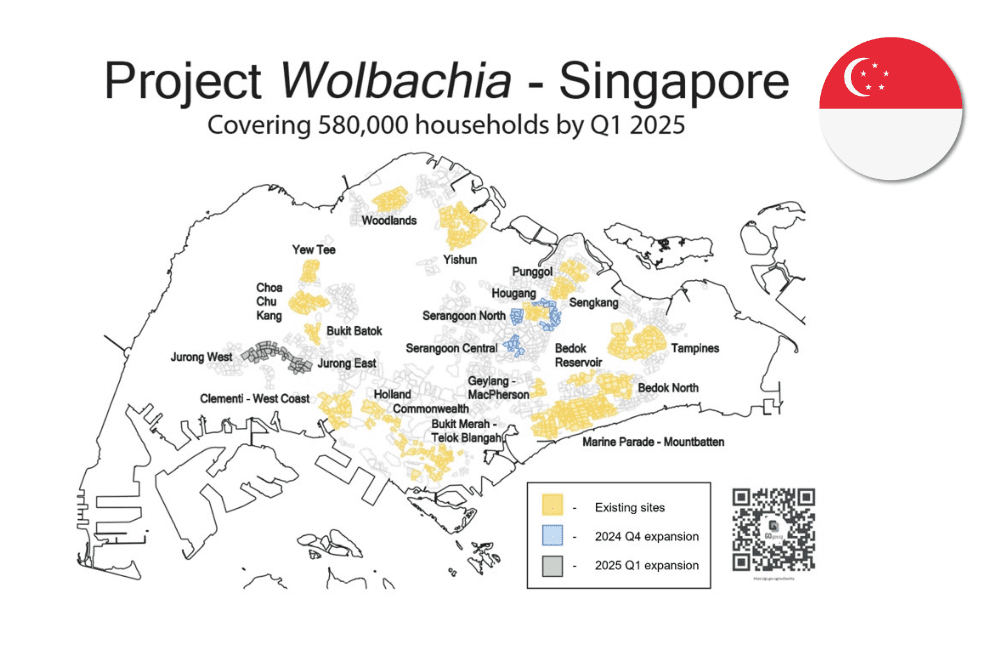Singapore expands Project Wolbachia to protect more households from dengue outbreaks
The National Environment Agency (NEA) announced a significant expansion of Project Wolbachia – Singapore, aimed at curbing dengue by reducing the population of the Aedes aegypti mosquito, the primary vector for the virus.
At a recent mosquito release event, Ms Grace Fu, Minister for Sustainability and the Environment, announced that the National Environment Agency (NEA) will extend Project Wolbachia to five additional sites starting from October 2024.
The expansion follows the successful outcome of a multi-site field study conducted in eight residential areas, where Wolbachia-Aedes mosquito releases led to a 75% reduction in dengue cases. The expansion will increase the project’s coverage.
Read more: Dengue Cases in Singapore Surpass 2023 Total with Over 10,000 Infections
Significant Impact on Dengue Prevention
The field study, which began in July 2022, demonstrated the effectiveness of Wolbachia technology in reducing the Aedes aegypti mosquito population by 80% to 90% in test areas. This reduction translated into a significant 75% decrease in the likelihood of residents contracting dengue. The Wolbachia-Aedes mosquitoes, which are male and do not bite, mate with female Aedes mosquitoes, leading to infertile eggs and a decline in the mosquito population.

Ms Grace Fu noted that the Wolbachia technology has led to a significant reduction in dengue cases and mosquito populations. She emphasised that this expansion is a key step forward in the ongoing efforts to combat dengue outbreaks in Singapore.
Expanding Project Wolbachia to More Households
Starting in October 2024, NEA will progressively release male Wolbachia-Aedes mosquitoes in five new areas.
- Hougang
- Serangoon Central
- Serangoon North
- Jurong East
- Jurong West
The expansion will begin with Hougang on 21 October 2024, with the remaining sites following in early 2025. This will increase coverage from 480,000 to 580,000 households across Singapore.
Releases will be conducted twice a week in the morning, and residents in these areas will be informed through notices displayed in lift lobbies.
Ongoing Community Efforts Vital to Success
Despite the success of Project Wolbachia, the NEA emphasised that community participation remains crucial in preventing mosquito breeding. While Wolbachia-Aedes releases effectively reduce mosquito populations, their impact can still be limited if mosquito breeding continues in the environment.
Moreover, the NEA stressed that “the Wolbachia technology is not a silver bullet.” Therefore, continued community action is essential. In particular, removing stagnant water and maintaining clean surroundings are critical to ensuring the long-term success of dengue prevention efforts.

Furthermore, the NEA urged residents to remain proactive in preventing mosquito breeding. This includes breaking up hardened soil, emptying flowerpot plates, overturning pails, changing water in vases, and keeping roof gutters clear.
With the expansion of Project Wolbachia, Singapore continues to strengthen its defences against dengue outbreaks. The NEA remains committed to monitoring and adjusting mosquito release volumes based on the abundance of the Aedes aegypti population, as measured by its Gravitrap surveillance system.
By working together, the government, health authorities, and the public can continue to suppress the spread of dengue and protect the health of Singapore’s residents.
For more information on Project Wolbachia, including updates on release sites and schedules, residents are encouraged to visit the NEA website or use the myENV app.
Image credits: National Environment Agency
Read more:

